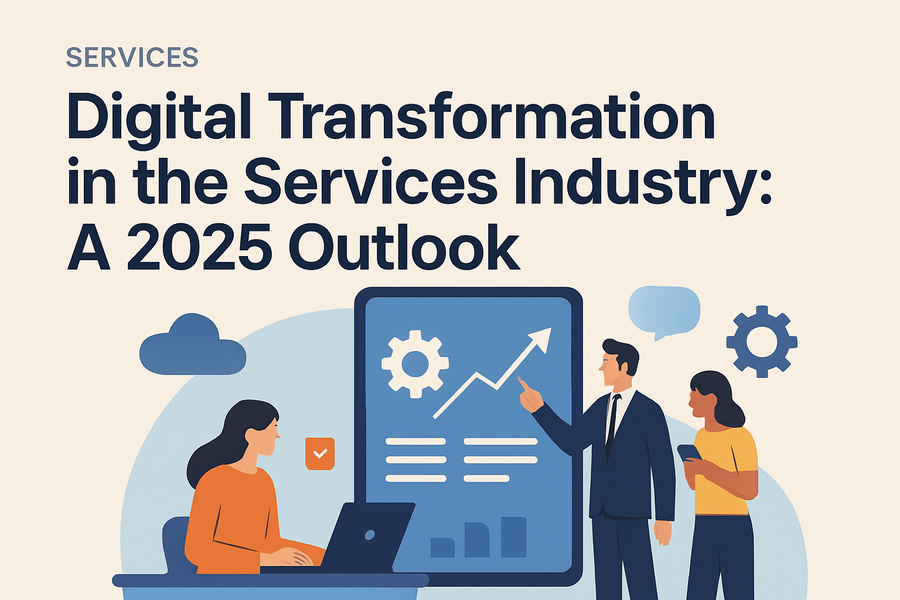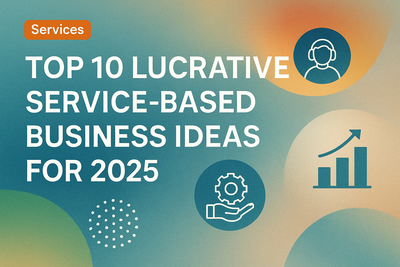Digital Transformation in the Services Industry: A 2025 Outlook
Introduction
As we approach mid-decade, the services industry is undergoing a profound digital transformation. From customer service to logistics, marketing to healthcare, digital technologies are reshaping how services are delivered, managed, and experienced. In this 2025 outlook, we explore the latest trends, emerging technologies, and strategic shifts that are defining the future of the services sector.

The Acceleration of Digital Adoption
The COVID-19 pandemic acted as a catalyst for rapid digital adoption across industries. In the services sector, organizations had to pivot quickly to remote operations, virtual engagements, and digital-first service models. Now, in 2025, this shift has solidified into long-term strategies. Companies are doubling down on automation, AI, and cloud computing to enhance operational efficiency and customer satisfaction.
Key Drivers of Digital Transformation:
- Customer Expectations: Modern consumers expect seamless, personalized service experiences across all touchpoints.
- Technological Advancements: AI, machine learning, IoT, and blockchain are enabling smarter, faster, and more secure service delivery.
- Competitive Pressure: Digital-native companies are disrupting traditional service models, prompting incumbents to innovate or risk obsolescence.
Emerging Technologies Shaping the Future
1. Artificial Intelligence & Machine Learning
AI is revolutionizing everything from customer support chatbots to predictive analytics. In 2025, AI-driven insights are helping service providers anticipate customer needs and deliver hyper-personalized experiences.
2. Cloud-based Platforms
The rise of SaaS and PaaS solutions allows service organizations to scale quickly, reduce infrastructure costs, and improve data accessibility. Cloud-native systems are now a standard across most service verticals.
3. Automation & Robotic Process Automation (RPA)
Routine tasks such as invoicing, scheduling, and reporting are increasingly handled by bots. This frees up human resources to focus on complex, value-added activities.
4. Augmented and Virtual Reality (AR/VR)
Industries like healthcare, education, and real estate are leveraging AR/VR to create immersive service experiences, from virtual tours to remote consultations.
5. Cybersecurity and Data Privacy
With more data being collected and stored digitally, ensuring privacy and security has become paramount. Advanced encryption, biometric authentication, and AI-based threat detection are crucial investments.
Industry-Specific Applications
Healthcare Services
Telemedicine, wearable health devices, and AI diagnostics are transforming patient care. Digital health platforms are making healthcare more accessible and efficient.
Financial Services
Fintech innovations are disrupting traditional banking. Mobile apps, robo-advisors, and blockchain-based transactions are becoming the norm.
Education and Training
E-learning platforms and virtual classrooms have matured significantly. Microlearning and AI-powered adaptive learning are enhancing educational outcomes.
Hospitality and Travel
Personalized booking systems, smart rooms, and virtual concierge services are redefining guest experiences. Contactless technology is now a standard expectation.
Challenges Ahead
While the benefits of digital transformation are clear, several challenges remain:
- Integration of legacy systems with modern platforms
- Talent shortages in digital skill sets
- Regulatory compliance and data governance
- Managing cultural change within organizations
Conclusion
Digital transformation in the services industry is no longer optional—it's imperative. As we move further into 2025, success will depend on an organization's ability to adapt, innovate, and place technology at the core of its service strategy. Those that embrace digital as a continuous journey rather than a one-time project will not only survive but thrive in the evolving landscape.
Whether you're a service provider, policymaker, or entrepreneur, staying ahead of these trends is essential. The future of service is digital, and the time to act is now.








